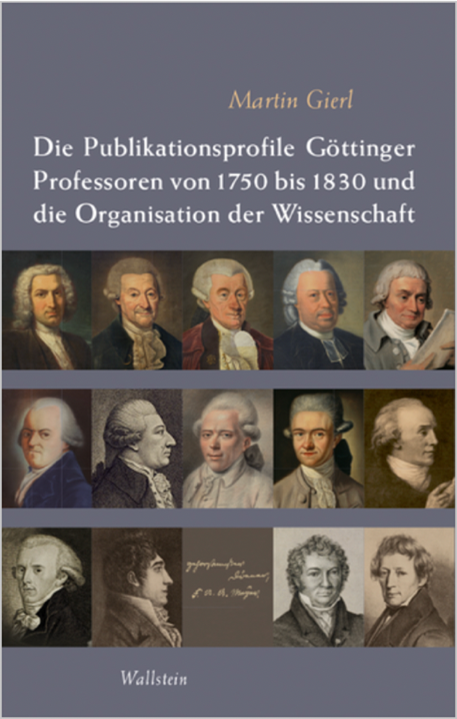Gierl Vorstellung Enlightenment Club
The difference between acting and happening is organization. I am interested in how the Enlightenment was organized and how it acted. How it affected society. How it organized organization. Media and their instrumentality are at the top of my list. The focus is on the processing of knowledge and information in the 18th century.
Knowledge has less to do with ideas than with organizing and managing the world.
Selected Publications:
Knowledge Technology, in: Historical Studies on Central Europe (HSCE), Vol. 5, No. 1 (2025), open access: https://ojs.elte.hu/hsce/article/view/10209
The thesis of the essay is that academic knowledge is a technology that continues to produce technology.
Knowledge is not the result of discourse but of organization. Language - writing - printing - media communication - regulated flow of information: Academic knowledge is about technology. Knowledge is shaped by the regulation of information flows. The discourse of authors is just a fundamental part of these regulations.
The essay uses the university apparatus, the journal system, the Turing-machine and Lichtenberg's physics to prove this. It shows how quality, coherence, progressive diversity, sustainable permanence, and mechanisms for testing, reproducing, transmitting, and supplementing what has been achieved emerge from organised quantity.
New Book: Die Publikationsprofile Göttinger Professoren von 1750 bis 1830 und die Organisation der Wissenschaft
What did Göttingen professors publish, when, and in which media? The Göttingen publication system at the dawn of modern science shows the transformation from professors who publish to authors who teach.

The book oulines the subject matters covered at the University of Göttingen and traces the development of scientific disciplines. It covers the formation of wissenschaftliche subjects and the periodization of research publication, the formulation of research goals and the “journalization” of publishing, and the emergence of independent disciplines after 1800. In 1750, a professor in Göttingen made it his ultimate goal to publish a complete series of handbooks on his discipline. In the 19th century, the scholarly world of handbooks began to transition into the scientific world of monographs.
Open Access => https://www.wallstein-verlag.de/9783835357976-die-publikationsprofile-g…
Books
- Geschichte als präzisierte Wissenschaft. Johann Christoph Gatterer und die Historiographie des 18. Jahrhunderts im ganzen Umfang. Stuttgart Frommann 2012.
- Pietismus und Aufklärung. Theologische Polemik und die Kommunikationsreform der Wissenschaft am Ende des 17. Jahrhunderts (Veröffentlichungen des Max-Planck-Instituts für Geschichte 129). Göttingen Vandenhoeck 1997.
Main Articles:
- Monks, Jews, pollemics, Enlightenment, in: Jonas Gerlings, Ere Nokkala (eds.), The Process of Enlightenment: Essays by and inspired by Hans Erich Bödeker (Liverpool, 2024).
- Synchronisation, in: Lilla Krász (ed.), Wissenschaften zwischen Tradition und Innovation – Historische Perspektiven. Sciences between Tradition and Innovation – Historical Perspectives, Wien 2022, 99-122.
- Umgemünzte Aufklärung. Die Numismatik im 18. Jahrhundert bis Eckhel, in: Bernhard Woytek, Daniela Williams (eds.), Ars critica numaria. Joseph Eckhel (1737–1798) and the Transformation of Ancient Numismatics, Wien 2022, 137-184.
- Negotiating Ideas: The Communicative Constitution of Pietist Theology within the Lutheran Church, in: Joke Spaans, Jetze Touber (eds.), Enlightened Religion. From Confessional Churches to Polite Piety in the Dutch Republic, Leiden 2019, 131-155.
- Johann Christoph Gatterer and History as Science, in: Keith Michael Baker, Jenna M. Gibbs (eds.), Life Forms in the Thinking of the Long Eighteenth Century, Toronto 2016, 19-43.
- Historisierung als Institutionalisierung: Johann Christoph Gatterers Verwissenschaft-lichung der Historiografie und die Konstruktion von Nation, in: Moritz Baumstark, Robert Forkel (eds.), Historisierung. Begriff - Geschichte - Praxisfelder, Stuttgart 2016, 112-128.
- Die Göttinger Aufklärung, in: Martin van Gelderen (ed.), Lichtenberg lacht. Aufklärung und Satire, Göttingen 2015, 9-44.
- Pietism, Enlightenment, and Modernity, in: Douglas Shantz (ed.), A Companion to German Pietism, Leiden 2015, 348-391.
- Das Alphabet der Natur und das Alphabet der Kultur im 18. Jahrhundert. Botanik, Diplomatik, Linguistik und Ethnographie nach Carl von Linné, Johann Christoph Gatterer und Christian Wilhelm Büttner, in: NTM 1, 2010, 1-27.
- Science, Projects, Computers, and the State: Swift’s Lagadian and Leibniz’s Prussian Academy, in: Max Nowak (ed.), The Age of Projects: Changing and Improving the Arts, Literature, and Life during the Long Eighteenth Century, 1660–1820. Toronto 2008, 297-317.
- Die Universität als Aufklärungsfabrik. Über Kant, gelehrte Ware, Professoren als Fabrikgesellen und darüber, wer die universitätshistorisch herausragende programmatische Schrift des 18. Jahrhunderts in Wirklichkeit geschrieben hat, in: Historische Anthropologie 13,3 (2005), 367-375.
- Compilation and the Production of Knowledge in the Early German Enlightenment, in: Hans Erich Bödeker, Peter Hanns Reill, Jürgen Schlumbohm (eds.), Wissenschaft als kulturelle Praxis, 1750-1900. Göttingen 1999, 69-104.
- Bestandsaufnahme im gelehrten Bereich: Zur Entwicklung der "Historia literaria" im 18. Jahrhundert, in: Denkhorizonte und Handlungsspielräume. Historische Studien für Rudolf Vierhaus zum 70. Geburtstag. Göttingen 1992, 53-80.
Presentation
"Local Enlightenment" Lecture as part of the public lecture series "Aufklärung 2.0" at the University of Göttingen, held on January 24, 2017 in the Aula am Wilhelmsplatz.

